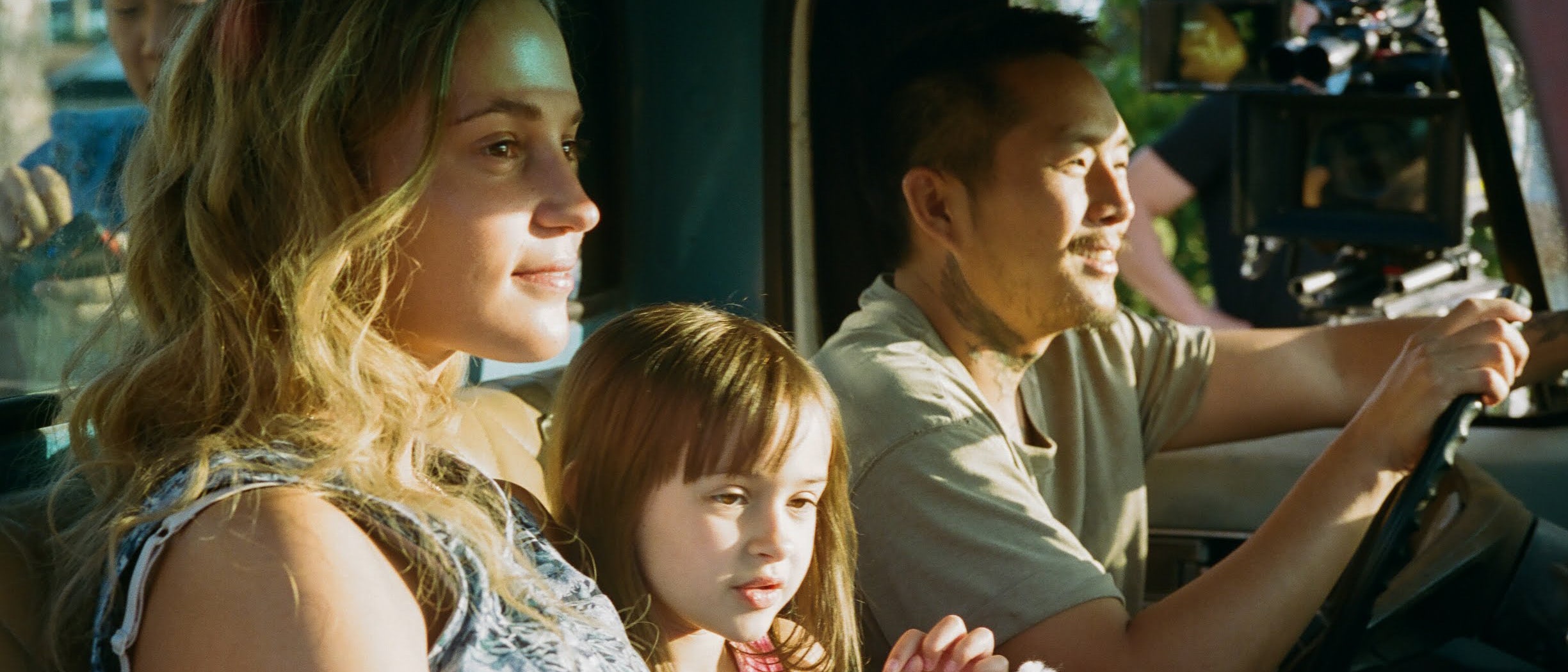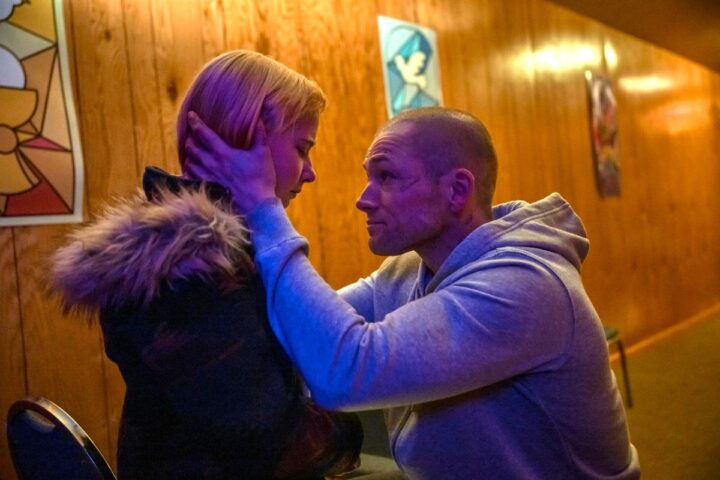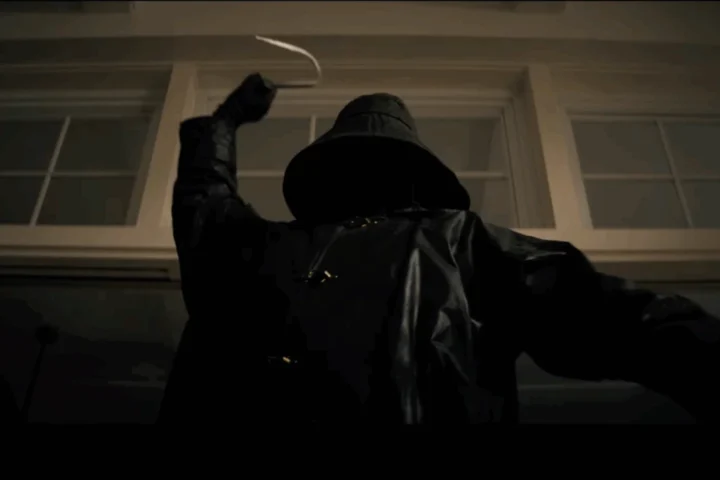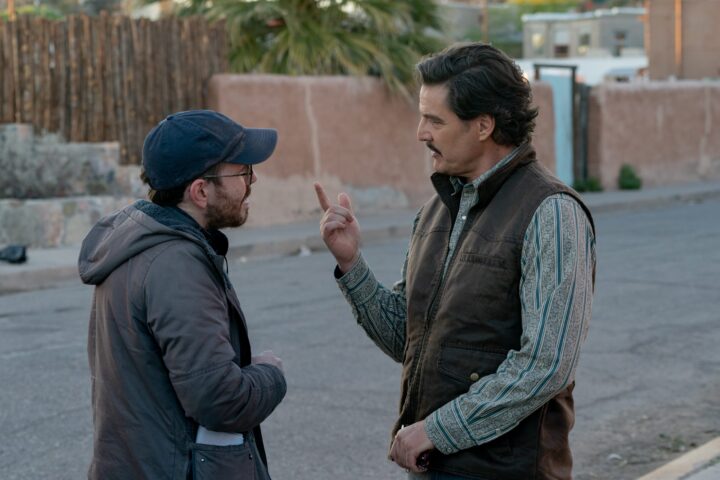Excellent intentions and important subject matter are toppled by overwrought melodrama in the busy immigration polemic Blue Bayou. It gives one no pleasure to declare that a film so ambitious, timely and good-hearted—about family separation and deportation due to draconian (lack of) immigration policy—plays like first draft prewriting in a hectic screenplay by writer/director/star Justin Chon (an appealing acting talent), biting off much more than he can effectively chew, or his film can accommodate.
While it is a bit early to call him a true multihyphenate, Blue Bayou creator Chon stars as Antonio Leblon, a thirty-something tattoo artist in New Orleans who, as the picture opens, is rejected for a job by a xenophobic prospective employer. Antonio can’t read, but sincerely asserts that he “can fix anything” and “will be a real asset.” No matter. “Where are you from?” he’s asked, the boss not satisfied until the lifelong United States resident admits his Korea origins. He also has a criminal record from a troubled past which included theft. That doesn’t help.
Antonio is stepfather to young Jesse (Sydney Kowalske), with whom he shares a tight bond in a relationship granted considerable screen time, and is married to Jesse’s mother, a harried local nurse named Kathy (Alicia Vikander). To the picture’s credit it is easy to believe their chemistry; both actors are good together. Their marriage is frowned upon by Kathy’s stern mother (Geraldine Singer), who spends the film sniping, “Are you done trying to fix him yet?”
The family is also under constant duress from Jesse’s biological father, local beat cop Ace (Mark O’Brien), a character that will be put through some very unbelievable paces as dictated by contrived expediency of the film’s final act. Jesse, the product of a brief fling, neither knows nor wants any relationship with Ace, and calls Antonio her dad. Her abandonment issues over Ace’s departure force Antonio to promise he’ll stick around.
Meanwhile, Ace has a sadistic partner, Denny, a truly repulsive local yokel cop played by the gifted Emory Cohen (Brooklyn) as the picture’s requisite villain. After Ace and Denny contrive a public altercation, Antonio is arrested and his undocumented immigration status is quickly uncovered, fast-tracking him for deportation.
The couple consults an attorney, Barry Boucher (Vondie Cutis-Hall), whose job in the screenplay is to state immigration policy, which here means that there are no protections or provisions—even though he’s lived in the United States for thirty years and since he was a toddler—that can keep Antonio here. Boucher is also expensive, and a retainer fee of $5000 nudges desperate Antonio back to criminality.
At this point—about a third of the way in—there’s enough story to carry the picture through its 112-minute running time, yet Chon expands the narrative in grandiose directions that diminish the established tension. First comes a return to stealing motorcycles, and then a baffling and substantial plot digression involving a chance encounter with a sad, dying Vietnamese woman named Parker (Lin Dahn Pham), to whom Antonio gifts a fleur de lis wrist tattoo. Parker returns the favor by inviting Antonio, Kathy and Jesse to a big family shindig where Kathy gets to belt out a backyard rendition of Blue Bayou (if only to justify the title). Later, there’s a heavy-handed sequence between Antonio and Parker on a motorcycle that redefines obvious.
The digressions don’t stop there—we endure the simmering tensions between Ace and Denny, numerous scenes of Ace’s intimidations, domestic showdowns between Antonio and Kathy, philosophical sunset chattering with Parker, explosive job losses and two frenzied physical altercations.
What happened to the compelling predicament of a family fighting unfair deportation? Why are there so many characters? What is with the tricked-up filmmaking techniques? Are the many “dreamy” flashbacks to maternal sacrifice in provincial Korea truly necessary? Why, in telling a pungent American disaster story of broken immigration, does Chon need to amplify such superfluous contrivances?
There is something off-putting, even pretentious, about a movie so enamored with its own outsized style and convinced of its sprawling profundity, especially when the basics—like, say, working with a great, Oscar-winning actress to perfect a highly specific regional American accent, which is considerably important yet sounds all over the map in nearly every scene of the finished film—have been bungled.
And then there’s the obscured immigration details. As someone who has twice gone through the gauntlet of immigration with two undocumented family members, including guardianship and status adjustment of a young child with abandonment issues, elements of the picture’s immigration procedural seem questionably fuzzy.
To begin, it is a significant challenge for a United States citizen to legally adopt an undocumented foreign national via an intercountry adoption, exacerbated by the individual stipulations of country of origin and/or the Hague Convention. Blue Bayou never makes it clear exactly how Antonio emigrated from Korea to the United States and ended up in a series of foster home. So he entered the United States as a three-year-old, alone, somehow, and was still undocumented, only to be shuttled through foster homes until his adoption and remained undocumented throughout? There are accommodations for permanent residency for such children as such, including Special Immigrant Juvenile Status (SIJS) adjustments.
Who advocated for his entry to the United States? If he was an orphan when he entered, what was the provision? The film is coy about his process of entry and why his ultimate adoptive parents did not complete his adjustment of status application. This is usually an urgent priority once adopted children are eligible, yet the film asserts that such lackadaisical family circumstances are commonly chalked up to mere apathy. That’s hard to believe.
It’s also stated in the film that Antonio’s former criminal record is clear as the “charges were dropped.” This is stated by Kathy in Boucher’s office, and we have no reason not to take it as truth. If this is the case, dropped charges/expungement would not be discovered upon arrest and instead would be incumbent upon the immigration petitioner to divulge during either the permanent residency application process, court hearing, or adjustment of status interview. This entails presenting any documentation of the offense and usually a written, good faith explanation. Dropped charges do not appear on a criminal conviction record nor do they constitute a removable offense.
And then there is the matter of Antonio’s birth mother, summoned to a court hearing to testify presumably to either his good moral character or her own culpability in not adjusting his status when eligible. Surprisingly, Antonio’s attorney claims to have tracked her down himself and has even spoken to her on Antonio’s behalf, without his client’s knowledge or blessing. Really? Attorneys work by the hour, right? This surprise announcement is presented as a narrative contrivance of the highest order, injected only to cause a domestic fracas and delivered in a meeting where Kathy, who believes Antonio’s parents deceased, is understandably taken aback.
Even more misguided is the film’s notion that the couple’s petty domestic squabbles—Kathy’s suspicion that Antonio is lying to her and stealing to cover the cost of attorney fees, and her anger that he has kept his adoptive mother a secret—would so compromise the couple’s marriage that they would separate, Kathy abandoning him in his greatest moment of need. Both issues feel small with respect to what’s at stake, diminishing Kathy’s credibility given that Antonio’s potential removal and the subsequent family upheaval—which would likely include a permanent bar to United States entry for her husband and the father of her unborn child—is the bigger, more important picture, and one which, unlike their smaller problems, is not in the couple’s power to solve.
Another implausibility comes late in the film when a sympathetic friend and ICE officer (Chris Bosarge) springs Antonio from jail for an impromptu sit-down where he explains that if Antonio should run—he’s giving him the chance to slip away—he will not pursue him. What does Antonio do? He chooses to return to jail and face deportation to a country he has never known, even though he has a newborn and a wife. This is written, not realistic.
Yet none of these suspensions of disbelief can complete with the epically overcooked, hothouse airport finale offering multiple changes of heart, desperate rushing to TSA lines, more tears in close-up than an audience should ever be subjected to, and knock-down, drag out histrionics as to be unimaginable, or unforgivable. Begging for audience tears, Chon crafts a final goodbye so overwrought it is painful to watch, but not for the intended reason. Further, it rings procedurally false as upon deportation those in escorted removal are often forbidden to see, touch or otherwise interact with loved ones (or even receive care packages). Blue Bayou presents a surprise family reunion in the public TSA line where the family stands together, unencumbered, freely interacting without any supervision, intervention or protocol (at least until hysteria rules). For a film about a reality-rooted subject, the final moments are movieish to a fault.
To its credit, Blue Bayou is smart about the confusing tangle of devastating, unfair bureaucracy that occurs when a person of little means, with a questionable background, falls into the quagmire of deportation. Because Chon is such a fine actor, it’s easy to empathize with his confusion that, as a lifelong American, he is suddenly an outsider in his country, someone to be ousted to a place he’s never been. But the picture would have been stronger to eschew its many dangling plot threads in favor of a more penetrating examination of the loss of personal and cultural identity in the face of such a brutal obstacle.
By inexplicably boiling an ocean of wild excess in characters, subplots and overheated stylization (supersaturated 16mm, blaring music, needless flashbacks, upside down shots, gee-whiz whirling camera) the picture loses focus, inadvertently diffusing the inherent drama of its central issue and raison d’être. Along the way, individual elements are fitfully compelling (including an exasperated Alicia Vikander’s contrived yet lovely rendition of the title tune) but overstated Blue Bayou too much—and simply not enough. Less would have been much more.
2 stars.



